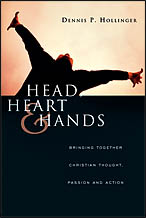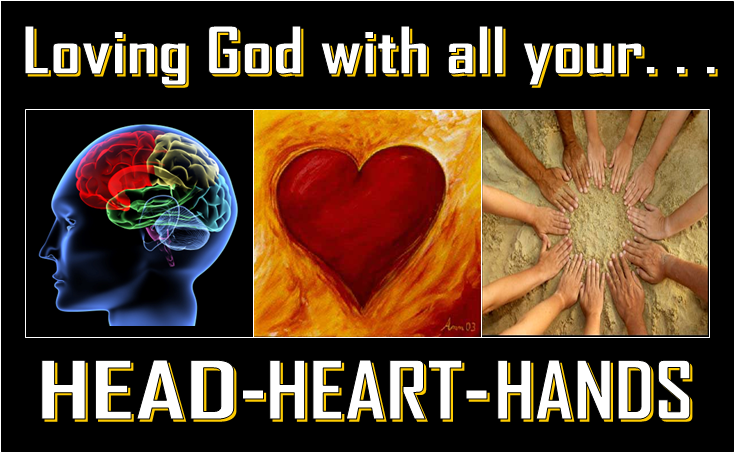
A few questions to kick off Christian Faith and the Head.* Looking forward to reading your responses.
- Where has the use of your mind, reason, and knowledge been most important as a follower of Christ?
- How has your mind been part of coming to Christ, growing in faith, and engaging the world?
- How do you apply the Scriptural principles for the use of your mind and knowledge of God into your life? How does this “perspective” compare to what is offered by the “world?” Note: feel free to take a step back and apply to the Body of Christ.
Note: More questions nestled in the exploration of Christian Faith and the Head, please feel free to address/comment upon any of them 🙂
Introduction
Some have considered the use of the mind critical to our relationship with God and the fulfillment of His mission. Others view the intellect as an impediment, denigrating the mind for getting in the way of a godly life.
God’s revelation to man requires our discernment as we examine His creation and as we understand His relationship with us.
- To what extent do you believe we can know God through His creation?
- How is your understanding of God fulfilled or broadened through His Word?
The author suggests that the varied approaches to how we use are minds point to God and His Image (See p.38 – 39). We are artistic and creative. We are rational and scientific in how we examine things.
- How do you balance artistic/creative with rational/scientific approaches to thought?
- How do you view the corruption of knowledge and its use as part of the fall of mankind?
- How does God respond to restore His relationship through our minds?
The Greek word for repentance is literally translated as “changing one’s mind.” Scripture shows us that this redirection of the mind is paired with a fuller action involving the heart and soul – a profession of faith (See Romans 10:9).
The belief in God is transformative. It changes how we view ourselves, mankind, and the world (See Romans 12:2). However, that transformation takes place as we fill ourselves with knowledge from God and His Word; it will be impeded if we pursue our own desires, leaning on our own understanding (See Romans 10:14-15).
Principles for engaging the world through our minds:
- Understand Scripture generally
- Apply God’s Word wisely in the context of the situations and issues of our lives
- Be prepared to give the reason for your life relationship with God to those who ask
- Work corporately to disciple (discipline) fellow believers
- Do all these things humbly and gently, being aware of God’s saving grace
A Christian Worldview – Theology 101
- The perception of ultimate reality
- God is Lord and Savior.
- He has called us to follow Him and revealed himself to us through Jesus – Son of Man and Son of God.
- An account of what is wrong with the world.
- As provided for His purposes, God’s creation is good.
- Mankind and our world is fallen from God.
- Left on our own, man pursues his own selfish desires; we believe we can fit it on our own.
- An assessment of human nature in the context of our world
- We have God’s image in us, a sense of right and wrong, and an awareness of Creation’s beauty and the ugliness of this Creation soiled by its inhabitants.
- Our fallen nature is redeemed by Jesus – God is accessible through His Son and our acceptance of his saving act of grace on the cross and resurrection.
- Christ is in conflict with the world; his disciples will be in conflict with the world.
- An awareness of where history is headed
- God will conclude our world with a new creation – and a judgment of the old creation.
- His followers are already part of the new creation, but will be so fully when he draws history to an end.
How do the above points (which together shape a Christian worldview) contrast with a “world”-directed perspective?
Next post in series wrestles with Distortions of the Head :0
*Drawn from an adult elective led by Kevin Milligan at Elizabethtown Brethren in Christ Church. Note: See the first post in the series for more on the genesis of this study guide as part of a local Emerging Scholars Network partnership (South Central Scholars Network PA FB and Christian Scholar Series).

Tom enjoys daily conversations regarding living out the Biblical Story with his wife Theresa and their four girls, around the block, at Elizabethtown Brethren in Christ Church (where he teaches adult electives and co-leads a small group), among healthcare professionals as the Northeast Regional Director for the Christian Medical & Dental Associations (CMDA), and in higher ed as a volunteer with the Emerging Scholars Network (ESN). For a number of years, the Christian Medical Society / CMDA at Penn State College of Medicine was the hub of his ministry with CMDA. Note: Tom served with InterVarsity Christian Fellowship / USA for 20+ years, including 6+ years as the Associate Director of ESN. He has written for the ESN blog from its launch in August 2008. He has studied Biology (B.S.), Higher Education (M.A.), Spiritual Direction (Certificate), Spiritual Formation (M.A.R.), Ministry to Emerging Generations (D.Min.). To God be the glory!

Leave a Reply